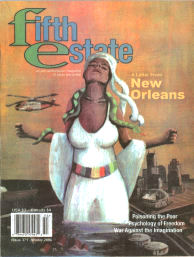Fifth Estate 371, Winter 2006 Add to the Bookbuilder

Fifth Estate Collective
About this Issue
This issue’s theme--The Psychology of Freedom--comes to the reader without pretension or self-righteousness. We are not trying to instruct others on how they should conduct themselves in their personal or collective lives. Rather, we feel it is important to explore the anti-authoritarian ideals we often project onto society from the inside of our communities and lives.
May 2, 2015 Read the whole text...
Various Authors
Letters
I read with some surprise EB Maple’s letter (see FE 370, Fall 2005) regarding an article I wrote which was published in the Winter 2005 issue of the Fifth Estate.
Maple writes: “The standard issue primitivism of the article’s message appeals to me in many ways...” Thanks, a rather condescending way to agree with some aspects of my vision, but an acknowledgment nevertheless.
May 2, 2015 Read the whole text...
Fifth Estate Collective
Contents of print edition
5 Letter from New Orleans
15 Psychic Liberation 6P the Almost Revolution
17 The War Against Imagination
20 No Borders
22 Retalin at Fifty
25 Poisoning the Poor
29 Psychology of Empire
30 Passion Fruit
27, 32–33, 37–38 Reviews
34 Both Sides Now
May 2, 2015 Read the whole text...
John Clark
Letter from New Orleans
Reclusian Reflections on an Unnatural Disaster
The following letter was sent to an International Conference on Elisee Reclus, the 19th century anarchist geographer and political theorist. The conference, which was held in Milan on October 12–13, was one of several planned for 2005 to celebrate the 175th anniversary of Reclus’ birth and the 100th anniversary of his death. I was invited to do a presentation but couldn’t leave New Orleans to attend. Fortunately, our electricity, which had been out for almost six weeks, resumed shortly before the conference, and I was able to write the letter hastily and find a place to email it. It arrived in Milan the day before the conference and was read during the proceedings, and it will be translated and published in the Italian anarchist magazine Libertaria.
May 6, 2015 Read the whole text...
Elizabeth Underwood
America Meet New Orleans
We live in a time and culture that does not understand, value, or manifest personal responsibility. The general doctrine is that even if you betray the rules of your religious practice you’ll be forgiven your digressions when you die, if you ask nice.
So, what happens when you combine a deeply entrenched culture of anarchy and individual responsibility with a political system, bureaucracy, cultural climate that is currently breaking records for its utter lack of introspection or capacity to admit mistakes? New Orleans meet America.
May 6, 2015 Read the whole text...
Chuck 0
Post-Katrina
Anarchy Works; Government Fails
After the disaster that struck the Gulf Coast in the wake of Hurricane Katrina, during the total failure of the government response, the first health services available in New Orleans were set up by anarchists and local residents.

The hub of this mutual aid effort was the Common Ground clinic, operated from a mosque in the Algiers neighborhood by former Black Panther, Malik Rahim, local residents, out-of-town anarchists and other radical activists. While local, state and federal governments were in a state of chaos and incompetence, neighbors organized their own spontaneous mutual aid, helping to rescue people from flooded homes and procuring food and supplies. Even some bars in the French Quarter established themselves as DIY relief centers.
May 7, 2015 Read the whole text...
Holly Jean
Psychic Liberation & the Almost Revolution
If you mention France, May 1968 today, you’re probably met with a shrug or a blank look. It’s easy to dismiss the ten million workers and students who went on general strike and the virtual shutdown of the French state as an historic blip. Another failed revolution.
But for the people who took part in those events, much more was going on--something besides a political uprising. Possibility bloomed. First hand accounts speak of a wave of mental liberation and spontaneous joy, with a sense that the old order of business had become obsolete overnight. How did reality shift so quickly into this new, liberated mood?
May 7, 2015 Read the whole text...
The Paris Group of the Surrealist Movement
“Warning Lights”
On the Recent Riots in France
Excerpted from a longer statement, November 2005
For three weeks, in the ghettos of the poor suburbs, on the outskirts of the outskirts, thousands of cars were burned, public utilities devastated, troops of police deliberately attacked.
This is a movement without explicit demands. This is a movement impossible to reduce to ethnic or racial demands.
May 7, 2015 Read the whole text...
Icarus Descending
Technology, Kids, and Autonomy
The War Against Imagination
In a classroom of five and six-year olds, I witness moments each day that vividly illuminate the tension and conflict within young minds struggling to understand their exposure to culture through mass media.
If survey data published in mainstream outlets like The New York Times and The Washington Post are believed accurate, let’s consider the following: a television is on an average of nearly eight hours every day in US households, of which the average child watches 28 hours per week, viewing an average of 20,000 commercials per year. The imagery these numbers conjure is terrifying; any anti-authoritarian educational praxis (the combined process of action and reflection) must grapple with this fabricated reality or it is simply irrelevant. We’ll get to that later.
May 8, 2015 Read the whole text...
Anu Bonobo
No Borders
Love, Liberation & the Internal Revolution
“In any form of duality, the one we have judged as inferior is the one that rules us.”
--Rodolfo Scarfalloto
Of all the intoxicating notions of insurrection, “without borders” is one of the most enduring. The toppling of walls, the deletion of divisions, the repudiation of alienation and separation remains an ever-elusive vision and immediate attraction.
May 8, 2015 Read the whole text...
Benjamin Shepard
Ritalin Turns Fifty
Confessions of a Teenage Junkie
If there is one enduring memory from my childhood, it is a small porcelain bowl containing three little white pills. The pills were as ubiquitous as morning orange juice and cereal, “Ben, don’t forget your Ritalin,” my mother would remind me as I rushed to meet my carpool on time.
“Don’t forget your Ritalin.” On any given day, some five million children and adolescents in the United States are given a psychostimulant of one form or another. Theory is that these drugs help young people handle their emotions, feelings, and reactions.
May 8, 2015 Read the whole text...
Fritz
Poisoning the Poor
As a survivor of more than a decade of psychiatric abuse, I oppose the pseudo-scientific concept of “Mental Illness” entirely. Unlike physical illnesses that are biologically based and sometimes have chemical cures, Mental Illness is a social construct used to justify abuse for the purpose of social control.
May 8, 2015 Read the whole text...
Ron Sakolsky
Only a Beginning
Review
a review of
Only a Beginning: An Anarchist Anthology. Edited by Allan Antliff. Arsenal Pulp Press. 2004. 352 pages. $25. Available from The Barn.
Left liberals in the United States laud Canada as a sort of parallel universe: a North American welfare state paradise where everyone has health care; foreign policy is about international peacekeeping; and a national propensity for politeness is translated into public discourse as civility. It’s a mythic place where anger doesn’t exist (except perhaps on the hockey ice), and anarchism is as genteel as a George Woodcock poem.
May 8, 2015 Read the whole text...
Mirror
Toxic Psychiatry
Review
a review of
Toxic Psychiatry by Peter R. Breggin. St. Martins Press. 1991. 464 pages. $18.
“The only known biochemical imbalances in the brains of nearly all psychiatric patients are those caused by the treatments.”
--Peter Breggin, Talking Back to Prozac
This book is as important and radical as R.D. Laing’s “The Politics Of Experience” or Thomas Szasz’s “The Myth of Mental Illness.” Breggin has been a long time campaigner for reform of the mental health system and in the early seventies he led a successful movement to end the horrific practice of Lobotomy in the US.
May 8, 2015 Read the whole text...
Mirror
Anti-psychiatry: the Psychology of Freedom
A Selected Bibliography
FE note: see related article Review, Toxic Psychiatry in this issue.
Breggin’s foundation web site: http://www.icspp.org/
Laing, R.D. & Esterson, A. (1964) Sanity, Madness, and the Family: Families of Schizophrenics. Penguin Books. ISBN 0140211578
May 10, 2015 Read the whole text...
William Kotke
The Psychology of Empire
This is an excerpt from Garden Planet: The Present Phase Change of The Human Species by William H. Kotke. AuthorHouse, 2005. 146 pages. $11. Available from the Barn.
Fear is the fundamental of this cultural form. The assertion is that the basic spiritual shift in consciousness was from a reality-view that saw the entire cosmos as alive and fecund to a reality-view that saw the earth as meaningless matter to be used to battle the scarcity of the world. On the one hand, the human is at home on the earth sharing space with other cooperating neighbor species in a reality of mystery and power. On the other hand, one lives in a world of accumulation where fear of scarcity and survival is prevalent.
May 10, 2015 Read the whole text...
Mark Berry
Passion Fruit: A History of (Con)Sensuous Games
The sign read: “Men can wear one article of clothing, and women can wear two articles of clothing.” This was the second annual naked smoothie party that boasted not just fruity blender drinks and creative nudity, but also a steamy hot tub, a banana shaped pool, dancing, body painting, massage, and more.
May 10, 2015 Read the whole text...
Jim Yarbrough
Hymns for Brueghel
Review
a review of
Hymns for Brueghel: Brambles of Berries, Rants, and Poetic Orgies by (un)leash. Published by Ink and Scribe in coordination with Cafe Press, 2005. Contact: Primal Revival Press at wyrdwizard < a t >hotmail < d o t >com. Available from the Barn for $20.
“The Full Moon strips civilization from the landscape, and it becomes fully 1,000 years ancient. The sun and moon know how to make eternal. But once an area is colonized, it stays colonized for so very long. How long before these delusions evaporate for good? Will I live to see it? Will I live my whole life under the occupation? [...] Yet I would Los Angeles become a Homeland again, for beneath my feet, by sunset or moonlight, crickets chirp by the tule villages where campfires are cooking acorn stew.”
May 11, 2015 Read the whole text...
Anne R. Key
How Nonviolence Protects the State
Review
a review of
How Nonviolence Protects the State by Peter Gelderloos. Signal Fire Press. 2005. 180 pages. $8. http://theanarchistlibrary.org/library/peter-gelderloos-how-nonviolence-protects-the-state
Being a person deeply committed to nonviolence, to spiritual anarchy, and to actively not going along with the status quo in any way, I have to admit I started reviewing this book with the intention of trashing it. Initially, my reaction was, “Oh, this is ridiculous; this is absurd; this is twisted.” But the more I read it, and the more I talked with people about it, the more I came to agree with Peter Gelderloos. To a point.
May 11, 2015 Read the whole text...
Steve Welzer
EcoVillage at Ithaca
Review
a review of
EcoVillage at Ithaca: Pioneering a Sustainable Culture by Liz Walker. 256 pages. New Society Publishers. 2005.
Those who are best comprehending The Problem are making alliances with those who are best comprehending The Solution. Liz Walker’s timely book is a chronicle, manual, and inspiration for that movement. The Problem being addressed is that the praxis of our civilization is unsustainable. The Solution is to move in the direction of living more locally and more lightly.
May 11, 2015 Read the whole text...
Anu Bonobo
Folk is Punk
CD review
a review of
Starlight on the Rails: Songbook, U. Utah Phillips, 4 CDs, AK Press, 2005, $39
Memory Against Forgetting, Casey Neill, CD, AK Press, 2005, $15. Available from http://akpress.org

Anarchist ideals have been expressed in a myriad of musical genres from rock to funk to jazz to world to trance. But the forms thoroughly connected to agit-prop are the most exemplary to me as they are extreme: folk, rap, and punk. This is not to say there’s never any revolutionary aspect to a saxophone riff or violin solo--or even an intoxicating sample tweaked to perfection on a laptop.
May 11, 2015 Read the whole text...
E.B. Maple (Peter Werbe)
Seaweed
Both Sides Now
an exchange
FE Note: A spin-off from our letters section, “Both Sides Now” presents two distinct views on a controversial topic, side by side. On the left [in print edition], FE reader Seaweed elaborates points first raised in his “Land And Liberty” (FE #367, p. 22–23). His views might be shared by many Fifth Estate readers and writers, but by no means all, as clearly evidenced by EB Maple’s response (see “Guns again?” in Letters, FE #370, p. 52). Hence, on the right [in print edition], we present Maples’s elaboration of an “opposing” view.
May 13, 2015 Read the whole text...
John Brinker
Some Good Bookchin?
Review
a review of
The Ecology of Freedom: The Emergence and Dissolution of Hierarchy by Murray Bookchin. AK Press. 2005. 491 pp. $23.
An influential theorist with a background in anarcho-syndicalism and Marxian theory, Murray Bookchin has spent the past thirty-five years developing and promoting social ecology, one of the few anarchist schools of thought to have its own school, the Institute for Social Ecology in Vermont. The latter part of his career has been devoted to curmudgeonly crusades to “save” anarchism and ecology from what he sees as its pitfalls: mysticism, biocentrism, and something called “lifestylism.”
May 13, 2015 Read the whole text...
Anu Bonobo
Lower East Side Librarian Winter Solstice Shout Out
Review
a review of
Lower East Side Librarian Winter Solstice Shout Out. Contact Jenna Free at leslzine--at--gmail--dot--com for barter to library workers; $3 to everyone else.
With the new age personal ‘zine found on blogs and in online journals, the photocopied pamphlet as personal soapbox has become a novel antiquity. But in all its cut-and-paste glory, Jenna Free’s annual Shout Out is the best of what this genre can and should be.
May 13, 2015 Read the whole text...
Anu Bonobo
Wilson’s Green Alchemy & Magick Poetry
Review
a review of
Gothick Institutions by Peter Lamborn Wilson. Xexoxial Editions. Dreamtime Village, 2005. 76 pages, $10. http://www.xexoxial.org. Available from the Barn.
A new Peter Wilson book is already a cause for celebration, but this lush collaboration exceeds even my already high expectations. Made beautiful by the production team of Miekal And Zon Wakest team at Dreamtime Village, our wise and playful rebel wields his waking fantasy to distill wild speculation in a dense and delirious brew of brave meditation.
May 13, 2015 Read the whole text...
Fifth Estate Collective
Books from the Barn
FE bookstore
Gothick Institutions by Peter Lamborn Wilson (Xexoxial 2005) $10 (see the review on page 38)
Garden Planet by William Kotke (AuthorHouse 2005) $11 (see the reprint on page 33)
Passion Fruit (Passion Fruit 2005) $5 (see the reprint on page 30–31)
Hymns for Brueghel: Brambles of Berries, Rants, and Poetic Orgies by (un)leash. (Primal Revival Press 2005) $20 (see the review on page 32)
May 13, 2015 Read the whole text...
